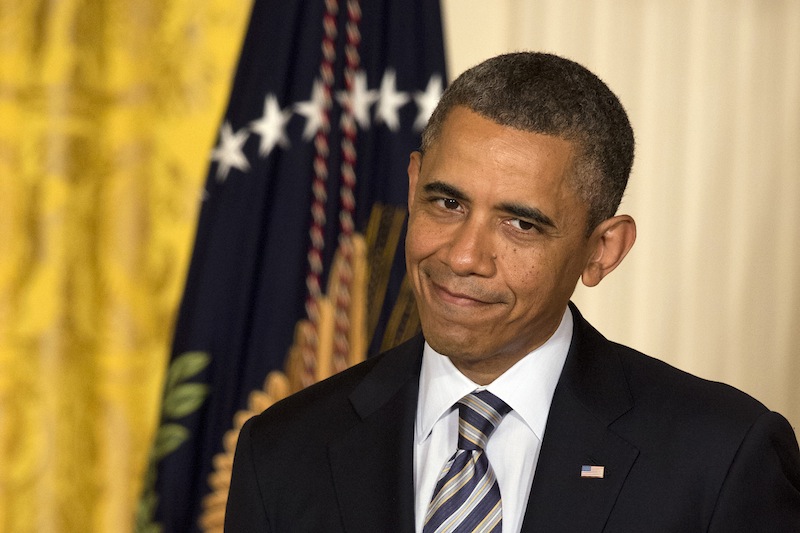WASHINGTON (AP) — Regrouping after a feud with Congress stalled his agenda, President Barack Obama is laying down a three-item to-do list for Congress that seems meager when compared with the bold, progressive agenda he envisioned at the start of his second term.
But given the capital’s partisanship, the complexities of the issues and the limited time left, even those items — immigration, farm legislation and a budget — amount to ambitious goals that will take political muscle, skill and ever-elusive compromise to execute.
“Those are three specific things that would make a huge difference in our economy right now,” Obama said. “And we could get them done by the end of the year if our focus is on what’s good for the American people.”
A breakthrough on any of the three issues would be a welcome development for a political system whose utter dysfunction was put on full display when the government was partially shut down for 16 days and the nation came perilously close to default. Both parties are looking for signs of whether that squabble and its eleventh-hour resolution will make it easier or harder for the two parties to find common ground in the future.
Still, the scaled-back vision for what might be feasible in the short term could be disappointing for Obama’s liberal supporters, who have been looking expectantly to the president to enact as much of his agenda as possible before Washington is consumed next year by midterm elections and the end of Obama’s presidency draws nearer.
Obama began the year calling for gun control legislation, expanded preschool education, an immigration overhaul, a higher minimum wage and for initiatives to address climate change. But like other moments in Obama’s presidency, fierce interparty divisions and fiscal showdowns have at times overwhelmed the capital and sapped it of any energy to move on other legislation.
Obama’s gun control push, spurred by a shocking elementary school shooting in Connecticut, collapsed in the Senate. And immigration legislation attracted bipartisan support in the Senate but has stalled in the Republican-led House, a blow to Obama’s hopes that Republicans would be motivated to support it after losing the Hispanic vote by wide margins in 2012.
Meanwhile, legislative efforts to increase wages, expand access to pre-K schools and reduce pollution have been nonstarters in the divided Congress.
White House spokesman Jay Carney said Obama will continue to press other priorities like college affordability, gun control and climate change, where the president has resorted to executive action after determining Congress was unlikely to act. But he said achieving a bipartisan budget deal or an immigration overhaul would represent no small accomplishments for the country.
“There’s no question they’re all difficult, given the current environment,” Carney said, adding that “the president is not at all convinced by the skeptics who say that we can’t get things done.”
By focusing on the budget, immigration and the farm bill, which combines agriculture policy with anti-hunger measures, Obama chose three heavy lifts that are already in the congressional pipeline. Yet each is fraught with difficulties, and chances of success for each one are limited.
“This White House hasn’t really demonstrated that it can walk and chew gum any more than Congress has,” said William Galston, a Brookings Institution scholar and former Clinton administration official.
Even in the first hours after the government shutdown ended, as Democrats and Republicans opened budget negotiations fault lines were beginning to emerge that could lead to deadlock if both sides adhere strictly to their previous positions. Senate Majority Leader Harry Reid, D-Nev., rejected the possibility that Democrats might agree to cuts to entitlement programs in exchange for relief from automatic spending cuts.
In exchange for entitlement cuts, Reid said, Republicans would have to agree to higher taxes — setting up an eerily familiar ideological clash between the two parties now charged with reaching consensus on a budget. Republicans will face intense pressure in their districts not to raise taxes, while Democrats will press Obama not to chip away at the nation’s safety net.
“If he buys into the idea that cutting Social Security benefits or cutting Medicare benefits is going to improve the economy, that’s a disaster for him and it’s a disaster for his party,” said Roger Hickey, co-director of the liberal advocacy group Campaign for America’s Future.
Further complicating the chances for any legislative successes this year is the poisoned atmosphere created by the recent fiscal standoff. House Republicans in particular bristled at Obama’s refusal to negotiate on the debt ceiling and at his belittling view of House Speaker John Boehner, R-Ohio.
“This recent fight has spoiled the opportunity for getting anything major done by the rest of the year,” said Ron Bonjean, a former top House and Senate Republican leadership aide. “There are a lot of hard feelings.”
At the same time, Republicans are smarting from having deployed a strategy aimed at undermining Obama’s health care law that failed, exposing deep GOP divisions and potentially giving Obama a temporary upper hand.
And the White House is hoping the hangover from the shutdown, which both sides acknowledge accomplished little, will produce a thaw in the intense pursuit of ideological posturing, creating an atmosphere more conducive to compromise and progress.
“We hope it is,” Carney said. “We have to hope for the best and assume the best here.”
___
Follow Josh Lederman on Twitter at http://twitter.com/joshledermanAP and Jim Kuhnhenn at http://twitter.com/jkuhnhenn
Copyright 2013 The Associated Press. All rights reserved. This material may not be published, broadcast, rewritten or redistributed.






